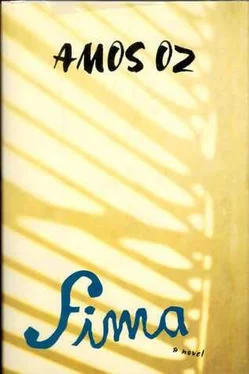"Calm down, Fima," Tsvi pleaded, although Fima was already calm. "It's only eight in the morning. Why arc you leaping on me like this? Come around one evening; we'll sit down and talk it over quietly. I've got some Napoleon brandy from France. Shula's sister brought it back with her. But not this week. It's the end of the semester and I'm up to my cars. They're making me chairman of the department. Can you come next week? You don't sound well to me, Fima, and Nina was saying to Shula that you're depressed again."
"So what, for heaven's sake, if it's not eight o'clock yet. Docs our responsibility for the language switch off outside office hours? Docs it only operate from eight to four with a break for lunch, weekdays only? I mean it, seriously. Forget Shula and Nina and your brandy for a moment. A fine time for brandy. The only reason I'm depressed is because the rest of you don't seem to be nearly depressed enough, considering what's going on. Have you seen the paper this morning? I'd like you to take what I've said as a proposal for the agenda. Under the heading of the defense of the language against increasing pollution. I'm suggesting that from now on, at least as regards the atrocities in the Territories, we simply stop using the word 'we.'"
"Fima," said Tsvi, "hang on a minute. Just sort yourself out. Which is the first 'we' and which is the second one? You've got yourself in a twist, pal. Why don't we just drop it for the time being? We'll talk about it next week. Face to face. We can't settle a subject like this on the phone. And I've got to run along."
Fima would not give in or let go:
"You remember that famous line in the poem by Amir Gilboa: 'Suddenly a man gets up one morning and feels he is a nation and starts walking.' That's precisely the absurdity I'm talking about. First of all, Professor, the truth, hand on your heart: Has it ever happened to you that you've got up in the morning and suddenly felt you were a nation? After lunch at the earliest. Who can get up in the morning and feel he's a nation, anyway? And even start walking? Maybe Geula Cohen can. Who gets up in the morning and doesn't just feel lousy?"
Tsvi laughed. Which encouraged Fima to a new outburst:
"But listen. Seriously. The time has come to stop feeling like a nation. To stop starting to walk. Let's cut that crap. 'A voice called to me and I went.' 'Wherever we are sent — we'll go.' These are semifascistic motifs. You're not a nation. I'm not a nation. Nobody is a nation. Not in the morning and not in the evening. And by the way, we're really not a nation anyway. At most we're a sort of tribe."
"There you go again with your 'we.'" Tsvi chuckled. "You're a little too far out, Fima. Just make up your mind: Are we 'we' or aren't we? In a hanged man's house you shouldn't throw the rope after the bucket. Never mind. I'm sorry, but now I really must hang up and run. By the way, I heard that Uri will be back this weekend. Why don't we fix something up for Saturday night? See you."
"Of course we're not a nation," Fima insisted, deaf and aflame with self-righteousness. "We're a primitive tribe. Scum, that's what we arc. But those Germans, and the French and the British too, have no right to talk down to us. Compared to them we're saints. Not to mention the rest of them. Have you seen the paper today? The way Shamir went on yesterday in Netanya? And what they did to that old Arab at Ashdod Beach?"
When Tsvi apologetically hung up, Fima continued to harangue the indifferent, bloated gargle emanating from the phone:
"In any case, we've had it."
He was referring collectively to the state of Israel, the dovish left, himself, and his friend. But after putting the receiver down, he thought it over and changed his mind: we mustn't get hysterical. He nearly called Tsvi again to warn him against the despair and hysteria lurking all around nowadays. He felt ashamed of his rudeness to his long-standing friend, such a learned and intelligent man, and one of the last voices to have stayed sane. Even though he was somewhat saddened by the thought that this mediocre scholar should now be head of the department and sit on the same chair as his illustrious predecessors, compared to whom he was a pygmy. At which point Fima suddenly remembered how, eighteen months ago, when he was admitted to Hadassah Hospital to have his appendix removed, Tsvika had enlisted the help of his brother the doctor. He had also enlisted himself and Shula; in fact the two of them had hardly left Fima's bedside. When he was discharged, Tsvi, with the Gefens and Teddy, had organized round-the-clock shifts to take care of him, and he had run a high fever, behaved like a spoiled child, and pestered them endlessly. And now, here he was not only hurting Tsvi but also interrupting him in the middle of shaving and maybe making him late for his lecture at the university. And just when he was on the point of becoming head of the department too. This very evening, Fima decided, he would call him again. He would apologize, but he would still try to explain his position all over again. But this time with restraint and cold, sharp logic. And he wouldn't forget to send a kiss to Shula.
Fima hurried to the kitchen, because he had the impression that before his conversation with Tsvika he put the new electric kettle on to boil, and by now it had probably gone the way of its predecessor. Halfway there he was stopped by the ringing telephone and found himself drawn in two directions. After a moment's hesitation he picked up the phone and said to his father:
"Just a moment, Baruch. There's something burning in the kitchen."
Rushing in, he found the kettle alive and well, shining happily on the marble countertop. So it was yet another false alarm. But in his haste he knocked the black transistor radio off the shelf and broke it. Returning, panting, to the phone he said:
"Everything's okay. I'm listening."
It turned out that the old man just wanted to tell him that he had found some workmen, who would be arriving the following week to replaster and paint the flat. "They're Arabs from Abu Dis village, so from your point of view it's strictly kosher, Efraim." Which reminded the old man of a charming Hasidic story. Why, according to Jewish tradition, are the righteous in Paradise permitted to choose between feasting on the Leviathan or on the wild ox? The answer is that there may always be some ultrafussy Jew who will insist on eating fish because he can't rely on the kashrut of the Almighty himself.
He went on to explain to Fima the ostensible point and the true point of this joke, until Fima had the impression that his father's distinctive smell had managed to infiltrate the telephone wires: it was an East European cocktail, combining a whiff of perfume with a lungful of unaired quilts, a smell of boiled fish and carrots, and the fragrance of sticky liqueurs. He was filled with revulsion, which he was ashamed of, and with the ancient urge to provoke his father, to challenge everything that was sacred to him until he lost his temper. And he said:
"Listen, Dad. Listen carefully. First, about the Arabs. I've already explained to you a thousand times that I don't think they're great saints. Can't you understand that the difference between us is not about kosher or nonkosher, or about Hell and Paradise; it's simply a matter of common humanity — theirs and ours."
Baruch agreed at once:
"Naturally," he intoned in a Talmudic singsong, "nobody would deny that the Arab too is created in the divine image. Except the Arabs themselves, Fimuchka: to our regret they do not comport themselves like human beings created in the image of God."
Fima instantly forgot his solemn vow to refrain at all cost from political arguments with his father. He set out to explain, once and for all, passionately, that we must not become like the drunken Ukrainian carter who beat his horse to death when the beast stopped pulling his cart. Are the Arabs in the Territories our workhorses? What did you imagine, that they would go on hewing our wood and drawing our water forever and ever, amen? That they would be content to play the part of our domestic servants to all eternity? Are they not human beings too? Every Zambia and Gambia is an independent state nowadays, so why should the Arabs in the Territories continue come Hell or high water quietly scrubbing our shit-houses, sweeping our streets, washing dishes in our restaurants, wiping arses in our geriatric wards, and then saying thank you? How would you feel if the meanest Ukrainian anti-Semite planned a future like that for the Jews?
Читать дальше












